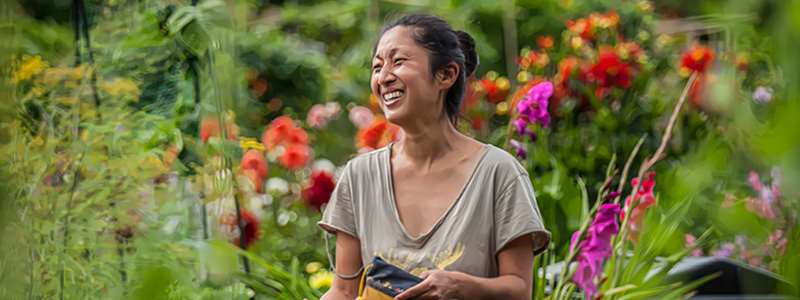Community Gardens
What are Community Gardens and why do we need them?

Community gardens—also known as allotment gardens—are vibrant communal spaces where individuals come together to grow food, flowers, and foster connections in an inviting public setting. Often found in urban areas, these gardens contribute to urban agriculture and support a more circular food system by offering residents a unique opportunity to engage with nature amidst the cityscape. With plots situated closely together, community gardens promote collaboration and camaraderie among participants from diverse backgrounds, ages, and abilities. By supporting local food production, these gardens enhance food security, strengthen community resilience, boost resource-sharing opportunities, and reduce Richmond’s material and carbon footprint. Each garden is co-managed by its members, who invest their time, resources, and passion into cultivating the space.
Benefits
Community gardens offer many benefits to the community, including:
- Strengthening a Circular Food System: Growing food locally reduces dependence on external supply chains, enhances food security, and minimizes waste.
- Skills and Knowledge: Residents gain valuable gardening skills, learn about sustainable food production, regenerative agriculture and grow their own food.
- Social Connections: The communal nature of these gardens fosters informal gatherings and friendships, enriching the neighborhood experience.
- Connection with Nature: Gardening offers a chance to reconnect with the outdoors, promoting mental clarity and physical wellness while nurturing an appreciation for the environment.
- Shared Resources: Tools, hoses, compost bins, and other equipment are available for all gardeners to use, promoting a circular model where materials are shared and reused.
- Common Areas: Many gardens feature shared spaces with seating where meals can be enjoyed and conversations can flourish.
- Biodiversity: By planting flowers, gardeners create habitats for beneficial insects like bumblebees and butterflies, enhancing local ecosystems and supporting circular urban biodiversity efforts.
- Educational Opportunities: Community members can learn about plant biology and sustainable agriculture, including composting, organic gardening, and regenerative soil practices that contribute to a resilient food system and deepening their appreciation for nature.
Community Gardens in Richmond
In Richmond, community gardens are located on public land, managed by the City of Richmond’s Park Services Department. The City collaborates with Urban Bounty, a Richmond non-profit organization, to oversee each garden. The City provides essential infrastructure, including water connections, fencing, signage, tool sheds, gravel pathways, while also enhancing soil health through organic compost amendments and wood chips.
Urban Bounty, on behalf of the City of Richmond, manages the daily operations of the gardens, constructing raised beds, providing soil, and handling membership and waitlist logistics. They also collect annual fees, which support garden resources like tools and equipment.
For more information about community gardens, including locations, costs, and how to sign up, visit urbanbounty.ca. Join us in cultivating community and growing together!
Pilot Project Underway
We are thrilled to announce a new pilot project: community garden beds made with recycled plastic lumber!
As part of Richmond’s commitment to sustainability and the circular economy, the City is piloting the use of recycled plastic lumber as a durable, long-lasting alternative to traditional wood for raised community garden beds. Made from plastic recovered from the ocean, this innovative material gives new purpose to valuable resources.
This initiative aligns with Richmond’s broader efforts to use sustainable materials, enhance public spaces and promote circular solutions within the community—making green spaces even greener.
Project Highlights:
- Sustainable Innovation: Trialling recycled plastic lumber to reduce reliance of virgin materials and extend the product lifecycles.
- Hands-on Learning: Terra Nova Rural Park’s focus on education and experimentation makes it an ideal site to test circular materials.
- Park Enhancement: Part of a larger effort to improve the entryway of the Terra Nova Red Barn and our green spaces.
Want to garden here? Urban Bounty is managing the waitlists for our community gardens. For more information on community gardens or to be added to a waitlist, visit urbanbounty.ca.
Questions or feedback on this pilot project? Email us at parksprograms@richmond.ca.
To learn more about the recycled plastic used in the pilot garden plots, explore our Info Sheet or visit www.oceanlegacy.ca.
For more information on the City’s circular economy initiatives, visit the Environment and Climate page.

